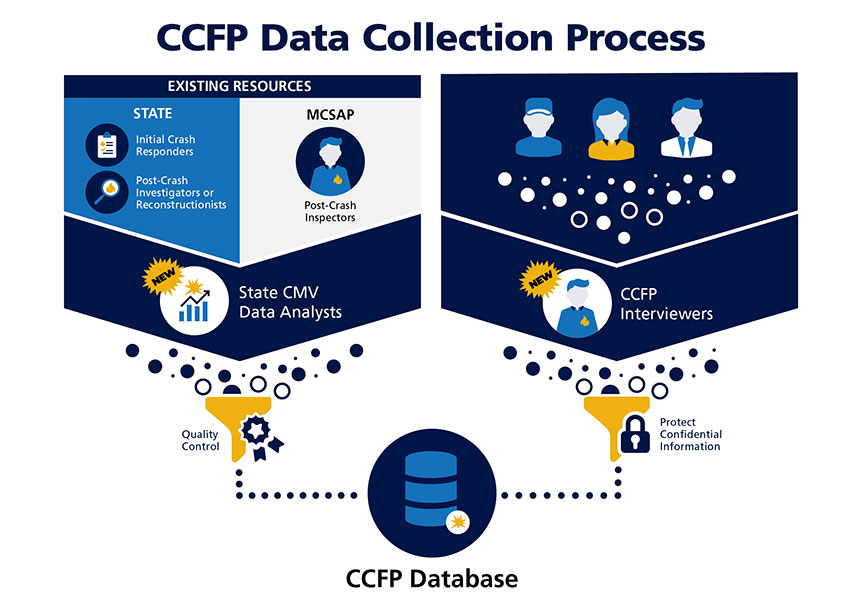Data Collection

To gain insight into the factors that contribute to crashes, the Heavy-Duty Truck Study will collect a comprehensive set of data on each crash included in the study. Compared to previous studies, the Heavy-Duty Truck Study will collect a broader range of data elements on a larger, more focused sample of crashes.
The data will come from two main sources:
- Crash data collected by State and local jurisdictions through their existing crash response procedures, and
- Confidential interviews conducted by the Bureau of Transportation Statistics (BTS).
Partnering with States and Local Jurisdictions
State and local jurisdictions already collect the majority of the information required for the study through their current crash response procedures. Rather than sending separate investigators for the study, the CCFP will gather the data collected by these highly trained and experienced teams, partnering with State and local agencies that participate in the study.
The data for the study will come from sources such as:
- Police crash reports
- Post-crash inspections
- Post-crash investigations
- Crash reconstructions
A State CMV data analyst will help coordinate the data collection efforts, analyze reports to identify answers to specific questions, oversee data quality, and enter the data into the CCFP database.
Most of these data collection efforts, including the work of a CMV Data Analyst, are carried out by State agencies and are eligible for funding through the Motor Carrier Safety Assistance Program (MCSAP) grant.
Conducting Confidential Interviews
To supplement the data collected by State and local agencies, the CCFP is partnering with BTS to carry out interviews under strict confidentiality protections provided by the Confidential Information Protection and Statistical Efficiency Act (CIPSEA). Learn more about BTS and interview confidentiality protections.
Data from the interviews will provide a more comprehensive view of each crash, helping to answer research questions not addressed by data collected through existing processes.
BTS will interview people and companies that are involved in the crashes included in the study sample, such as:
- Motor carriers
- CMV drivers
- Dispatchers
- Passenger vehicle drivers
- Pedestrians
- Witnesses
Through these confidential interviews, the CCFP will obtain data about factors such as:
- Scheduling
- Vehicle inspection and maintenance
- Driver hiring practices
- Driver compensation and benefits
- Distracted driving
- Truck stop/rest area availability
To protect the privacy of respondents, BTS will compile information and provide aggregated, anonymized data to the CCFP for use in the Heavy-Duty Truck Study. FMCSA will not receive access to the original, complete interview data nor to information that would enable them to tie interview responses to a specific individual, company, or crash.
